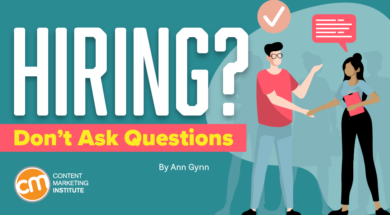Once upon a time, you had an opening on your content marketing team.
Combining through the resumes, you winnowed the pile to a half dozen potential unicorns who should know how to craft content that grabs (and keeps) your audience’s attention while keeping the brand’s goals top of mind.
On the appointed day, you clicked on the video conference link and popped up one of the finalists. Of course, you asked a bunch of questions. After all, you were looking for answers.
But there may be better interviewing strategies for a content marketing vacancy than bombarding candidates with questions.
Bombarding candidates with questions may not be the best interview technique for #content marketers, says @AnnGynn via @CMIContent. Click To Tweet
My advice? Don’t ask them any questions.
Yes, you read that right – stop with the questions. Kick the Q-and-A format to the curb.
Instead, turn it into a storytelling exercise and give story prompts to the candidates.
Why? You can assess their ability to weave together a story. Given you want to hire someone to tell stories about your brand, their ability to tell stories about themselves gives you a great understanding of their talent (or lack thereof) that their resume can’t.
Storytelling also allows you to better distinguish one candidate from another. After all, two candidates may regurgitate the same years of experience and the same titles held, but when they tell their experiences as a story, you will remember their differences. Why? It’s science. People remember stories. People forget facts and stats.
A Stamford University study done decades ago asked students to memorize 12 words. Half studied the list for two minutes. The other half turned the words into a creative narrative. Almost all (93%) of the students who told a story recalled the words. Only 13% of those who studied the list could do the same.
More recently, Make It Stick authors Chip and Dan Heath also did an experiment at Stamford. They asked students to give a one-minute speech about violent crime. Students used an average of 2.5 statistics in their speeches – only 5% of the audience could recall any statistic. One in 10 students told a story – 63% of the audience could remember the stories.
(And yes, I see the irony in using statistics to help make my point on the power of storytelling.)
But you probably didn’t need those numbers to appreciate the power of stories. Just think about the last time you interviewed candidates for a content marketing role. You smartly scheduled them all in a single day. By 5 pm, the ones who stood out probably weren’t the candidates who spouted perfunctory facts and figures. You can’t recall – without reading your notes – who wrote weekly newsletters or who did a daily blog. No, the memorable candidates told a story (or stories) you could easily recall and connect with their faces.
Content marketers tell stories around the brand. Job candidates for #ContentMarketing should be able to tell stories about their professional experiences, says @AnnGynn via @CMIContent. Click To Tweet
Ask no questions, and you’ll get more than facts
While what you want to learn from a candidate may differ based on the role, company, culture, etc., you can use these tips to customize the foundation for your interviews.
First, pull together a list of verbs that elicit stories. Some of my favorites include:
- Tell me …
- Describe…
- Explain…
- demonstrations …
- Spell out…
(Use “spell out” when the candidate cuts their story short or doesn’t flesh out the necessary details.)
Now, it takes a little practice to use active voice in declarative sentences in interviews. To help you get started, consider these prompts (and adjust for the role as necessary) for some typical “questions” in your next interview for a new content marketing team member.
Instead of questions, use declarative prompts with verbs that elicit stories, says @AnnGynn via @CMIContent. Click To Tweet
scenario 1
Don’t ask: What did you do at your last company?
Prompt a story: Tell me about when you joined your last employer and how that led to where you are today.
This promptly takes the candidate away from regurgitating their resume and into a space of reflection. As they go from the beginning to the middle to the end (or their current status), you can discover how they view their growth, changing responsibilities, and any other takeaways from the job experience.
You also will learn what they most want to highlight – what they prioritize. Do they focus more on the process or the results? Do they go too deep into the details or not enough? Are they circumspect and insightful, or do they take a just-the-facts approach?
scenario 2
Don’t ask: How do you develop story ideas? or How do you approach your writing?
Prompt a story: Walk me through the process – from idea to production – of creating the last article you wrote.
Nebulous questions about the creative process can lead candidates to wax philosophically or speak in generalities. The prompt can elicit a more concrete response because they will talk about a recent experience. You can learn how they view their role in the creative process and understand the other roles with whom they work.
scenario 3
Don’t ask: How do you handle feedback?
Prompt a story: Describe a time when you received feedback that you didn’t agree with.
If you ask the feedback question, you’ll find that every candidate appreciates feedback because it helps them deliver better work in the future. It’s a non-starter question, kind of like the classic interview question – what’s your biggest weakness? Any candidate worth their salt will turn their “weakness” into a strength.
Using this prompt again allows for specificity. More importantly, it lets you see how the person handles a negative situation. Did they speak up and share their disagreement with the feedback giver? Did they explain why or why not? (In some cases, it might not be worth addressing the difference in opinion because the boss would react poorly.) What happened in the end?
scenario 4
Don’t ask: We offer both remote and in-office work environments. Which do you prefer?
Prompt a story: Explain what an ideal work environment looks like to you.
Candidates want the job offer – even if they later turn it down. So they will give the answer that best correlates with the company’s workplace environment.
The prompt gives a better glimpse into how well they might fit into your company’s culture. The details in their story highlight what’s most important to them – location, people, flexible schedule, etc.
Be a good listener too
Don’t forget that a good audience also motivates good storytelling. Listen actively. React nonverbally – head nodding and smiles encourage the storyteller to continue – and verbally – recap or repeat a point from their story to share how that might work at your company.
Of course, you may find a candidate who tells a story that goes on and on. First, mentally note how well they understand the audience and storytelling purpose. Then, interrupt when they pause to move the story along by saying something like, “Oh, that’s really interesting. Tell me how it ended up.”
With these story-prompt interviewing techniques, you can accomplish two things at once. First, you’ll learn about the candidate’s experience and insight as you would in a traditional question-and-answer interview. But you’ll also discover if they have that hidden unicorn horn – they can tell good stories that always keep their business purpose (ie, getting the job) in mind.
HANDPICKED RELATED CONTENT:
Cover image by Joseph Kalinowski/Content Marketing Institute
.
Follow us on Facebook | Twitter | YouTube
WPAP (697)


